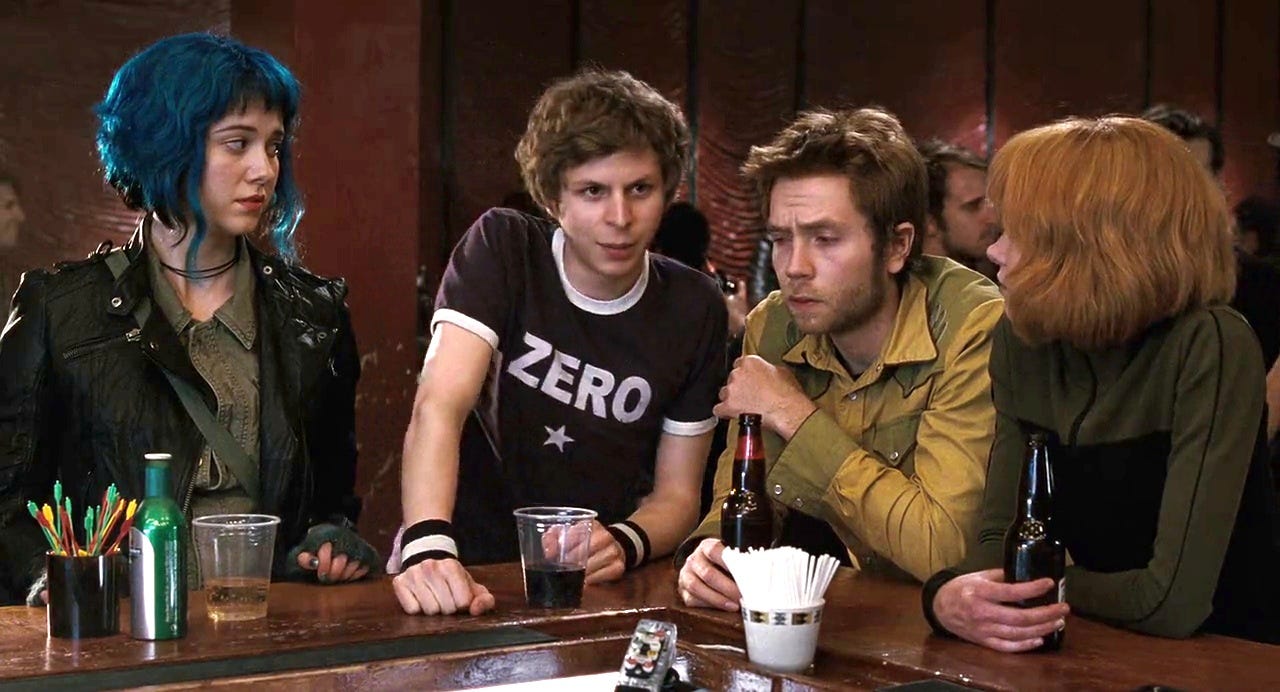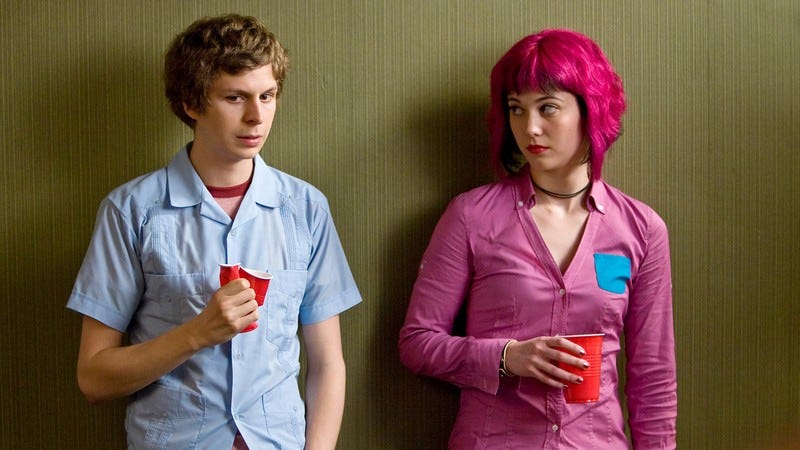The Favourites
Scott Pilgrim vs. the World
Scott Pilgrim vs. The World is one of the most enjoyable films that I constantly return to. Directed with frenetic energy by Edgar Wright and perfectly capturing the heart of the original comic, the film follows the titular Scott Pilgrim as he falls in love, gets in fights, and ultimately takes home his newfound love. While the film follows this rather standard plot, it’s with the fantastic side characters, the outstanding editing and energy, and the funny, sarcasm-drenched script that the film succeeds. But while this is simply a fun film one can watch without diving deeper, there is also an underlying theme entrenched throughout about responsibility, growing up, and learning respect for yourself and others.
All of the previously mentioned highlights of the film help play into these themes. By having manic editing and fight scenes, slower, more grounded scenes are allowed to breathe. Side characters don’t just provide funny asides but are fully fleshed out by people whose growth is evident and helps support the main character. The script is witty and sarcastic, but again this allows more realistic elements room to shine. We’re in for the ride but Wright knows to inject some pathos along the way.
One of the ways the film became so popular is by having a main character that directly reflected its target demographic: Scott Pilgrim is a loser in his early twenties. This is not a slight against either the audience or the character (speaking as someone who was a twenty-something loser), as the film needs the character to be in a rut, and people can fall into complacency at any stage. The growth of his character (and the hopes of the core audience) requires him to be stuck but also to be oblivious to it, much like people can be blinded to their failures. If you are of kin to Scott, you are shown his faults, and in this way can better see your own failings and how you can be your own worst enemy.
This is shown throughout the film as Scott battles his way through the exes. Each ex has glaring red flags, from vanity to greed and more, and Scott initially believes he is battling for the heart of Ramona. But as Scott’s own faults become more apparent, it instead becomes a battle to not be another evil ex. The purpose shifts from fighting the exes to fighting himself and the poor habits he has fallen into. It’s not about becoming a champion but becoming a better person. By the end of the film, when he has to face off against the final villain “Nega-Scott”, there is no battle, no massive fight. Nega-Scott is a really cool guy because Scott has already faced everything standing in his way; he’s already battled himself.
We can see the progression of Scott as a better person begin to affect the people around him as well. The Sex Bob-ombs become increasingly better as they progress throughout the competition. Knives Chau becomes more confident and determined. Young Neil becomes Neil. Everyone else is moving on as Scott faces the exes, and we can see them pulling away from Scott when he regresses and becomes selfish again. It’s only in his acceptance of his poor treatment of Ramona and Knives that he is finally able to overcome his selfishness. Even if he did so in the name (or idea) of love, that love is selfish when it hurts others. In realizing this Scott takes a major step forward in redemption and becoming an adult.
This is the step that all the exes fail to make. All of them are stuck at the point they were dumped by Ramona, from the cocky jock to the pitiful man-child. They have all been unable to accept the change that came with the breakup, unable to move on and grow-up. This also is what leads to all of their defeats at the hands of Scott, as he can recognize their weaknesses and uses that to his advantage, both in the battles and in his romance with Ramona. By having the red flags of the exes become blatant, he can see his own.
The overt stylization of the film also plays a part in Scott’s maturing. The film exists in this hyperrealized version of reality, blurring life and video games and comics into a single stream. This means that when Scott feels something, is hurt or broken, it is all the more powerful, for the emotions in these mediums cross over as well. When he fails he goes to a barren dessert of death. When Knives is struck her highlights are literally punched out of her hair. By having these emotions and feelings enhanced, Scott, a man who is constantly running and hiding from the hurt he has caused, has no option but to feel everything. The heightened emotional reality makes it impossible for anyone not to be overt with their feelings.
This stylization also applies to the 21st Century Manic Pixy Dream Girl Ramona Flowers. Ramona is quite literally the girl of Scott’s dreams, as she can traverse his dreams to get from one place to another. But the fact that this is a casual, thrown-off idea should indicate just how foolish the idea of a “dream girl” is. The manic pixy dream girl stereotype, while easily applied to Ramona, is a trope of male convenience. These characters generally lack motivation and reality outside of their interactions with the main character. With Ramona, we see the damage this trope causes, as her interiority is ignored by all the other exes and Scott in lieu of “winning” her heart. Again we see that love when expressed only as a goal instead of a communication is a selfish act, one that Scott must learn to avoid.
Ramona almost doesn’t exist outside of her interactions with Scott initially, and we can see her fighting against this stereotype. When Scott plays her a romantic song he wrote for her, she isn’t won over by its cheesy emptiness. When he complains about fighting the exes, she doesn’t apologize or make him feel better, she tells him that this is his choice, not hers. She changes her hair often and without regard for Scott, because Scott’s opinion doesn’t (and shouldn’t) matter when it comes to her hair colour. We see her fleshing herself out as a person until Scott finally can see it himself. She is his dream girl, but she exists in the real world, and the real world has challenges that Scott must accept.
We see the direct opposite of this with Knives Chau, as she actively tries to exist only for Scott. Upon being broken up with Knives tries to transform herself into the manic pixy dream girl stereotype she sees Ramona to be as well. She dyes her hair, gets new clothes, and tries a new attitude, but it fails to win Scott back in the end because it is false. The Scott we meet at the beginning would have easily fallen for this, but through the trials he faces he comes out with a better sense of who he is and of the women in the world around him. That’s why the ending is so important. Scott needed to choose Ramona over Knives because Knives (along with only being 17) also needed to figure out who she was. By choosing Ramona, Scott chooses adulthood.
In the end, Scott and Ramona are not destined to be together forever. Their future is a complete unknown, the film ending with a video game countdown asking if we’re willing to continue. This is the question we face when maturing, if we’re to continue down a path of slow self-destruction or if we’re going to continue down a path of enlightenment. Neither path is guaranteed success or failure, but neither is life, and growing up is realizing that nothing being guaranteed is all a part of the joy.







Great review! I watched it when I was a twenty-something loser and didn't like it much. Probably was too much of one! I'll give it a rewatch now. Think I'll definitely appreciate it this time.